Enveloped by strings and with its plaintive air, Charlotte’s Va! Laisse couler mes larmes in Werther is affecting enough with its outpouring of emotion too long repressed. In the hands of a detailed artist like the mezzo-soprano Elena Maximova, it fairly brings a tear to your eye and indeed conjured up pin-drop silence in the Opera House’s Joan Sutherland Theatre. Her plummy instrument, with its characteristic lachrymose Russian quality, is wielded with such psychological insight it makes you wonder why the opera isn’t called Charlotte, Goethe be damned.
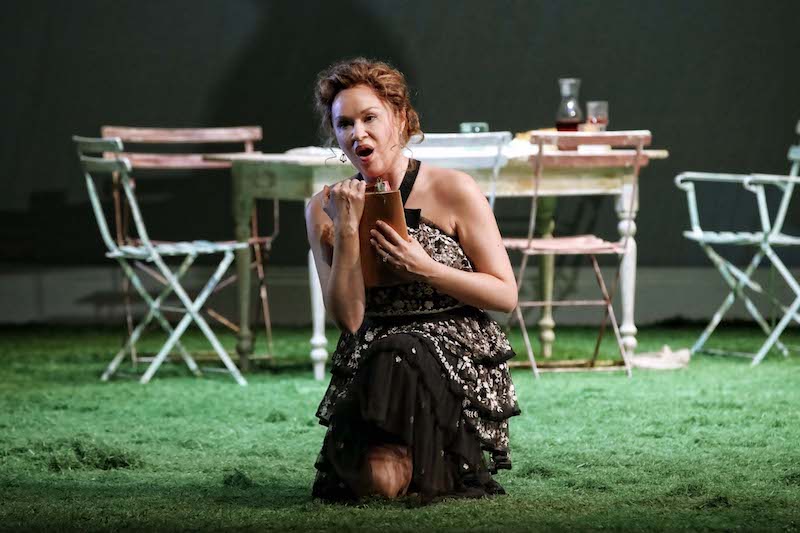 Elena Maximova in Opera Australia’s Werther. All photos © Prudence Upton
Elena Maximova in Opera Australia’s Werther. All photos © Prudence Upton
Elijah Moshinsky’s production of Massenet’s Werther updates the action of Goethe’s 1770 novella to the present day, with a distinct mid-century flavour emerging in both set and costumes. There doesn’t seem to be one device amongst chers enfants, and what phone there is has a rotary dial. This elastic sense of time has the benefit of upholding the circumstances of the drama – Charlotte’s sacrifice and Werther’s outsider status are both difficult to swallow in 2019. It’s sensitively realised by Constantine Costi (listed as co-director), who is expert at establishing Act I’s domestic scenes and the joyful home life Charlotte leaves behind. Also astute are Michael Yeargan’s handsome sets, particularly the transparent back wall of Act I that allows us a glimpse of the natural surrounds and a touching staging of the Clair de lune, a parade of couples (and the less lucky) making their way home. These idyllic tableaux are brilliantly juxtaposed with the monochrome, thoroughly bourgeois interior of Charlotte’s new home with Albert in Act III, looming and funereal.
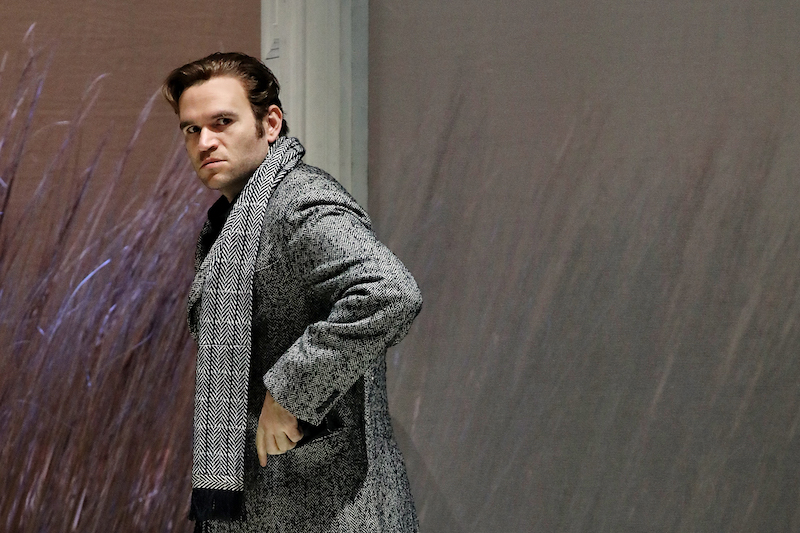 Michael Fabiano in Opera Australia’s Werther
Michael Fabiano in Opera Australia’s Werther
The most anticipated aspect of the evening was American tenor Michael Fabiano, returning to the company in his role debut as Werther. It’s a part that suits his established brand of intensity well and showcases his powerful tenor, and he indeed offered up many moments of exciting singing. As can only be expected, Fabiano still has room to grow – while he was effective, he wasn’t always moving, and there were too many moments of telegraphed, rather than felt, emotion. As he demonstrated in last year’s Lucia di Lammermoor, the tenor can sometimes wield his instrument inelegantly. Werther requires a certain amount of delicacy that he didn’t always bring, Pourquoi me réveiller losing its full impact for the same reason. However, it remains a very promising debut, with highlights including an ardent O nature and an appropriately introspective Lorsque l’enfant revient, really the heart of the role. He also negotiates well Massenet’s habit of requiring singers to switch from singing full out to sudden leaps into high, soft notes, as with the phrase ‘Ce sera ma part de bonheur’. Fabiano achieved this with aplomb – no mean feat.
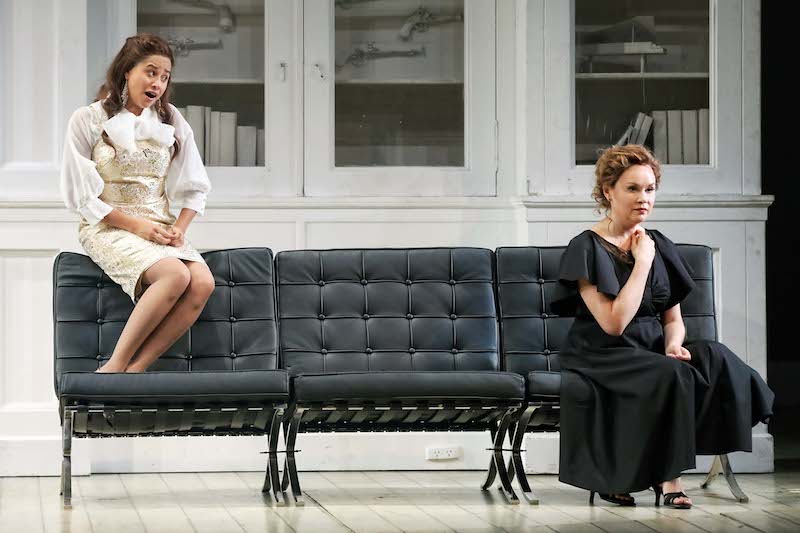 Stacey Alleaume and Elena Maximova in Opera Australia’s Werther
Stacey Alleaume and Elena Maximova in Opera Australia’s Werther
Elena Maximova has been performing Charlotte for a number of years now, and that experience shows. Sumptuous of tone with plenty of metal in the voice, she doesn’t possess the typical sound for the role, but that matters little when she’s onstage. Her Charlotte is deeply felt and vividly realised, honourable to the point of martyrdom and prisoner to everyone’s idealised image of her – Werther’s, her late mother’s, her father’s, her husband’s, even her siblings. The third act belonged entirely to Maximova, the varying moods of the Letter Aria woven into a veritable monologue of foreboding and pain. She deployed a hint of a smile in the voice when reading Werther’s recollection of her siblings, only to replace it with an urgent astringency when coming to his more troubling missives. The aforementioned Va! Laisse couler mes larmes had the intimacy of a chanson, Maximova spinning daringly soft lines, while Ah! mon courage m’abandonne showed this Charlotte to be every bit as tortured as Werther. Let’s have the mezzo back very soon please.
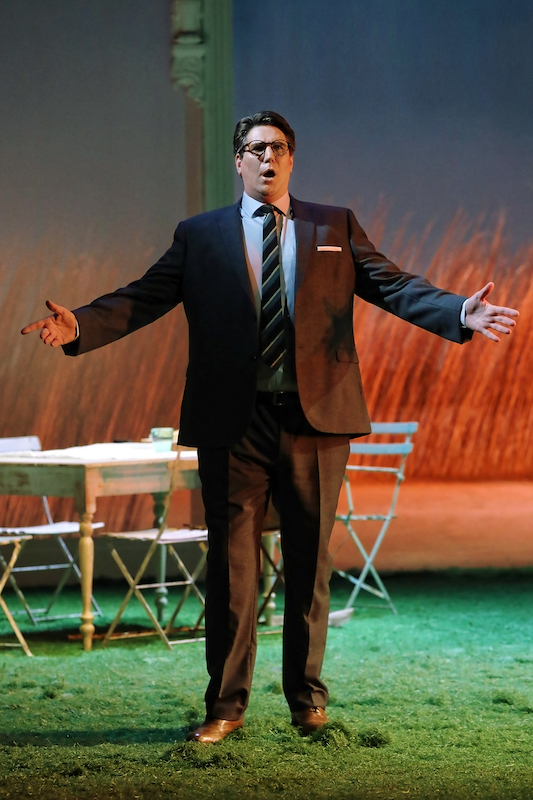 Luke Gabbedy in Opera Australia’s Werther
Luke Gabbedy in Opera Australia’s Werther
Among the supporting cast, Stacey Alleaume’s sparkling soprano is a perfect fit for Sophie, making much of her two brief arias. Some of the character’s more hyperactive perkiness could be toned down, but Alleaume smartly shows us the backbone underneath it all as Sophie comes to realise the depth of her sister’s pain. Luke Gabbedy demonstrates a clean and focused baritone as Albert, upright, gruff and uncomprehending as to why he is only minimally charming to Charlotte. He also has a good line in repressive and cruel, as when he orders her to give Werther the pistols. Though Richard Anderson sounded underpowered at first, he is a convincingly jocular Bailiff, tender and warm, while Nicholas Jones (fast becoming an OA star, surely) and Andrew Moran play drinking buddies Schmidt and Johann to the hilt. The children’s ensemble are impressively natural onstage, while Haotian Qi and Anna Dowsley make fun appearances as Massenet’s weirdest inventions, the cameo roles Brühlmann and Kätchen.
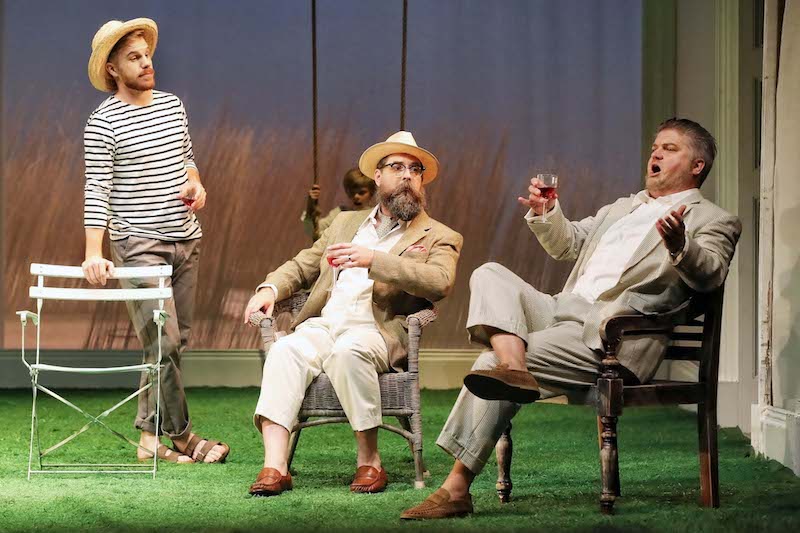 Nicholas Jones, Richard Anderson and Andrew Moran in Opera Australia’s Werther
Nicholas Jones, Richard Anderson and Andrew Moran in Opera Australia’s Werther
In the pit, Carlo Montanaro delighted in Massenet’s lush score and orchestral flourishes, turning in a highly idiomatic account. He especially savoured the composer’s depiction of Act 1’s rural setting, while avoiding the heavy-handed lingering that doesn’t allow Massenet to take flight. The overall effect was passion balanced with elegance, ideal for this blood and guts drama.
Opera Australia’s Werther is at the Sydney Opera House until March 11












Comments
Log in to join the conversation.